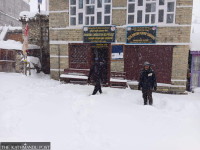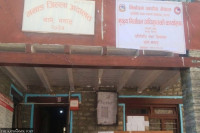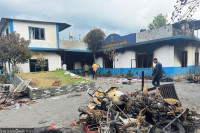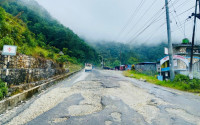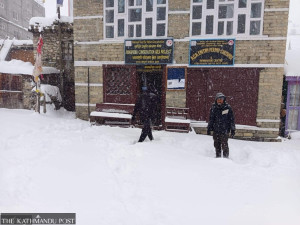Gandaki Province
Alternative source sought to address chronic water shortage in Beni
Beni Bazar Drinking Water Project initiated a project to lift water from the Myagdikhola at a cost of Rs5 million.
Ghanshyam Khadka
Keeping in view the chronic drinking water shortage in Beni, the district headquarters of Myagdi, Beni Drinking Water Users’ Committee has sought an alternative water source to fulfil the water needs of its residents.
Beni reels under an acute drinking water shortage every dry season as water level sharply decreases in the stream from mid-March to mid-June. According to the committee, the Pumdikhola Drinking Water Project generally supplies 17 litres of water per second but the water supply plunges to 12 litres per second during the dry season.
“The drinking water supply is often disrupted during the dry season since the water source dries up. The water supply also gets obstructed in the rainy season as floods and landslides frequently damage the pipeline. So we have initiated a water lifting project as an alternative despite it being comparatively expensive,” said Pradip Regmi, an engineer at the district office of the federal drinking water and sewerage management project.
Beni Bazaar Drinking Water Project initiated the alternative project around four months ago to lift water from the Myagdikhola, around 400 metres below, and store it in a reserve tank. The project is estimated to cost Rs5 million.
“The construction of a reserve tank is going on at Baraha Pakho. The project will lift water in the dry season, when the Pumdikhola Drinking Water Project is unable to supply enough water to Beni,” said Regmi. He estimates that the water lifting project will be completed by the end of the current fiscal year.
At present, water is supplied to Beni through an eight kilometre long pipeline installed along the Beni-Jomsom road.
“The pipeline is often damaged by landslides. It is difficult to repair the pipeline as it is long and equally wide,” said Yam Kisan, manager at the Beni Drinking Water Users’ Committee. “Repair work of the pipeline is also full of risks for the workers since the iron pipeline is in a landslide-prone area.”
There are around 19,000 people in 1,030 households in Beni.
Meanwhile, the federal drinking water and sewerage management project has also been constructing a water treatment plant to supply clean and safe drinking water to Beni residents.
A slow sand filtration tank had been constructed in Beni with the loan assistance of the Asian Development Bank some 15 years ago. But the filtration tank stopped working in the past few months. The user’s committee has been using chlorine to purify water after the filtration tank became dysfunctional.
“The construction of the water treatment unit will ensure the quality of drinking water in Beni,” said Regmi.




 14.12°C Kathmandu
14.12°C Kathmandu.jpg)
